By Dr Minh Alexander NHS whistleblower and former consultant psychiatrist
The FPPR referral was first published on 24 December 2019 by Nick Wallis @nickwallis on his specialist Post Office trial website: https://www.postofficetrial.com/
Is Paula Vennells a Fit and Proper Person?
Paula Vennells is another senior official appointed under the coalition government whose leadership and actions have been called into serious question. In 2012 she was appointed the CEO of Post Office Ltd, a company wholly owned by the government, through the Department of Business, Energy and Industrial Strategy (BEIS). She led Post Office Ltd for seven years, until parachuted earlier this year by NHS Improvement, to the Chair of Imperial College Healthcare NHS Trust.
This appointment took place as a High Court class action by subpostmasters against Post Office Ltd gained momentum.
Vennells’ exit from Post Office Ltd also coincided with another golden parachute in February 2019 onto the board of the Cabinet Office.
Hundreds of subpostmasters were seriously mistreated by Post Office Ltd and scapegoated for accounting anomalies, when the company was well aware of software bugs in its computer system that could have caused financial shortfalls. Post Office Ltd accused subpostmasters of carelessness or dishonesty. Some had to pay for the anomalies, some were bankrupted, some were prosecuted and sent to prison. In one of the most shocking cases, Seena Misra a pregnant subpostmaster was sent to jail whilst carrying her second child, and forced to leave her then ten year old son behind:
“She was jailed on her son’s 10th birthday.”
The High Court has now found that the Post Office knew about software bugs in its Horizon computer system for many years. But it falsely maintained that its computer system could not be responsible for financial anomalies. It also denied that it could remotely access branch records and remotely alter information about transactions, when in fact it could.
In evidence to the parliamentary BIS select committee in 2015, Paula Vennells denied that the Post Office Ltd had been responsible for any miscarriages of justice:
“Paula Vennells: The decision to set up the mediation scheme was mine, with the board of the Post Office, because Second Sight, as they mentioned, produced a report in the summer of 2012. We were genuinely concerned about the issues they raised, and the fact that these people had challenges. We are a business that genuinely cares about the people who work for us. If there had been any miscarriages of justice, it would have been really important to me and the Post Office that we surfaced those. As the investigations have gone through, so far we have no evidence of that. As you will know, we are bound by the Disclosure Act to make known anything that we come across that might contribute to that. The difference is that we simply wanted to know, to give those people the opportunity to be heard, because they told us they hadn’t been.”
At the 2015 hearing she maintained that the Horizon system was “working very well” and commented on issues of public confidence and organisational reputation:
“Paula Vennells: Perhaps, as Ian said and as you heard earlier, the most significant finding from it is that we can continue to have confidence in the Horizon system and how people are running post offices across the country
“Paula Vennells: Ian said—he is quite right—that the reason we set up this mediation scheme was to get to the truth about this system. The system itself is working very well.”
“Paula Vennells: It does stop with me. Also, therefore, as chief executive, I am responsible for the reputation of and what happens for the Post Office.”
The High Court judgment against Post Office Ltd describes the company’s denial thus:
“929 This approach by the Post Office has amounted, in reality, to bare assertions and denials that ignore what has actually occurred, at least so far as the witnesses called before me in the Horizon Issues trial are concerned. It amounts to the 21st century equivalent of maintaining that the earth is flat.”
Apropos the concerns about unsafe prosecutions by Post Office Ltd and suspected mass miscarriages of justice, the Criminal Cases Review Commission – which investigates miscarriages of justice – confirmed that it was handling 35 cases including 22 prison sentences.
In the light of:
- Court findings of extreme denial and misleading or factually incorrect evidence by Post Office Ltd and its witnesses;
- The fact that one of the trial judges has passed a file to the Director of Public Prosecutions about the veracity of some of Post Office Ltd’s witnesses;
- The terrible harm suffered by subpostmasters and their families and the prolongation of their ordeal by Post Office Ltd’s denials;
- High Court findings of a failure to properly investigate concerns and improper reputation management by Post Office Ltd;
I have referred Paula Vennells to CQC with respect to FPPR. I have asked CQC to review Imperial College Healthcare NHS Trust’s FPPR arrangements. As it is NHS Improvement that is responsible for appointing non-Foundation NHS trusts’ Chairs and NEDs, I have effectively asked for a review of NHS Improvement’s practices. The FPPR referral is provided below in the appendix.
Vennells of course answered to the government, so serious questions remain about the government’s role in the mishandling of the scandal. The fragmentation of the Post Office and privatisation of Royal Mail by the coalition government, after 499 years of public ownership, was hugely controversial, and politically sensitive.
“There was only one loser in this Royal Mail privatisation: the taxpayer”
“Five lessons Vince Cable must learn from the sale of Royal Mail”
There was much government hype about the Post Office sell off and restructuring, including the photo op in 2012 with Norman Lamb, the then BIS Postal Affairs minister.
Did the government authorise or otherwise allow a cover up of the Horizon computer system failures?
Did the government respond adequately to a 2015 request by the parliamentary select committee, which oversees BEIS, to investigate concerns?
Committee Chair to Vince Cable Secretary of State:
The latest High Court judgment notes that the legal costs incurred so far by the Post Office trial are astronomic:
“The parties’ joint costs are approximately now £27 million”
Lord Arbuthnot who has supported subpostmasters has very appropriately called for a judge-led Inquiry:
“We need an inquiry and, since the Post Office has repeatedly given inaccurate information including to me, it needs to be led by a judge. It may be that the best person to conduct the inquiry would be the judge who already has such extensive knowledge of the details, Sir Peter Fraser. He has done much of the work already.”
Lord Arbuthnot has also called for a clear out of Post Office Ltd board:
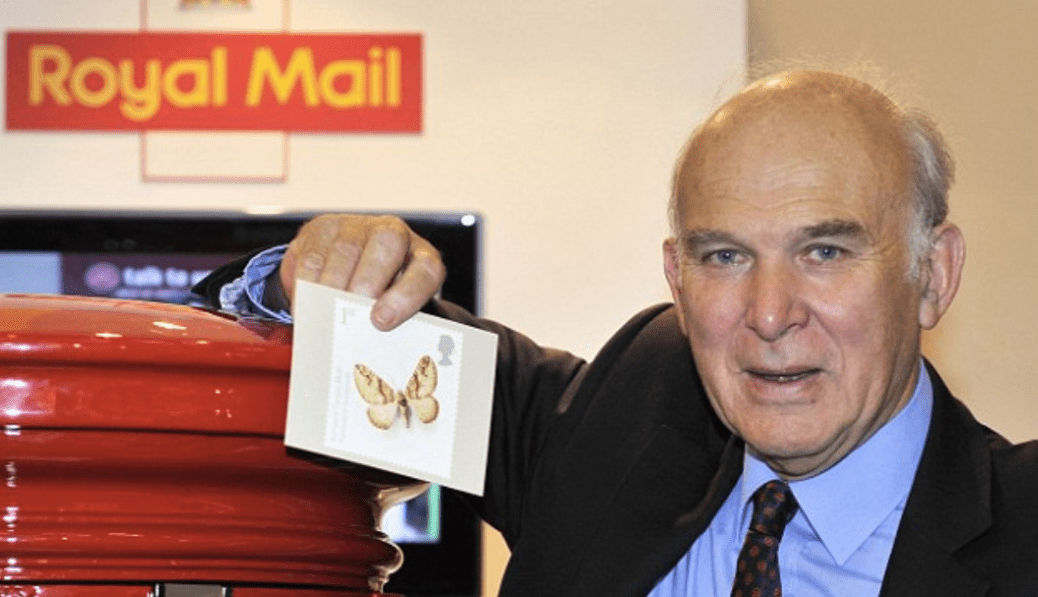
UPDATE 29 DECEMBER 2019
Lord Arbuthnot has in today’s Times called for Paula Vennells to step down from her public roles at Imperial College Healthcare NHS Trust and the Cabinet Office:
“Former Post Office chief Paula Vennells told- quit public jobs”
Importantly, he commented:
“I don’t think if I were running an NHS trust, I would want her to be involved in it”
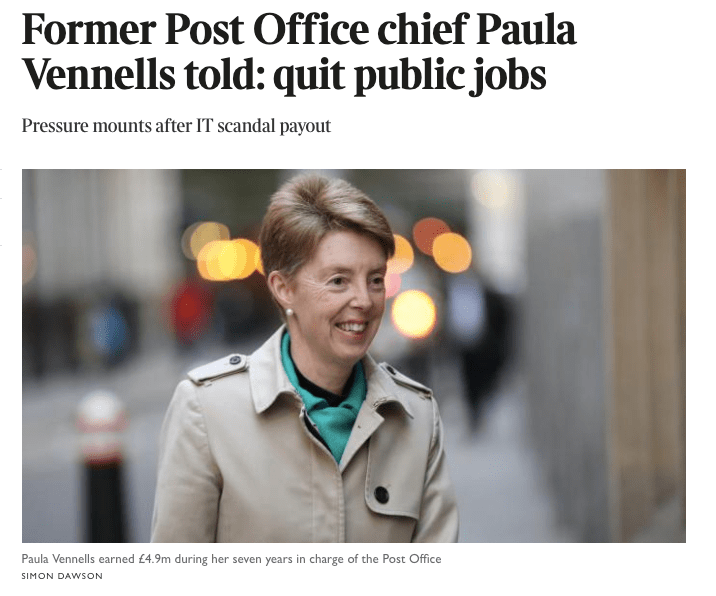
UPDATE 20 JANUARY 2020
Christopher Head one of the claimants in the Post Office trial has set up an online petition for a judicial inquiry into the scandal:
UPDATE 27 FEBRUARY 2020
The National Guardian as ever, got it wrong with Imperial and Paula Vennells as well. This is a brief account of her dash to an event at Imperial on 24 February 2020:
My Beautiful (Ministerial) Launderette: The National Guardian and Paula Vennells
UPDATE 2 MARCH 2020
A Safeguarding concern has been raised with Alan Smith, the Bishop of St Albans:
UPDATE 4 MARCH 2020
Information disclosed today by the Crown Prosecution Service adds to the general concern about the competence and probity with which Post Office Ltd wielded its prosecutorial functions.
The CPS can take over private prosecutions where concerns have been raised. CPS has disclosed that although its records may not be complete, it was referred five private prosecutions by Post Office Ltd. It decided to take over two of these and discontinued them. I will try to find out more.
APPENDIX
The FPPR referral to CQC:
BY EMAIL
Nigel Acheson
Deputy Chief Inspector of Hospitals
Care Quality Commission
24 December 2019
Dear Mr Acheson,
FPPR referral on Paula Vennells, former CEO of Post Office Ltd and current Chair of Imperial College Healthcare NHS Trust
I would be grateful if the CQC could look into whether Paula Vennells is a fit and proper person to be a director on an NHS trust board, under CQC Regulation 5 Fit and Proper Persons (FPPR).
This is in relation to the widely publicised failings by the Post Office Ltd, where she was a senior manager from 2007 and the CEO between 2012 and 2019, before taking up her current post as Chair of Imperial College Healthcare NHS Trust.
Paula Vennells presided as CEO over a period in which Post Office Ltd:
– Resisted criticisms of its Horizon computer system, which has since been demonstrated to cause errors in accounting;
– Repeatedly publicly denied faults in its computer system, when it was actually aware of such faults;
– Resisted concerns that it had treated subpostmasters unfairly and had wrongfully prosecuted some of these individuals over accounting anomalies that were caused by its own computer faults;
– Continued to pursue and prosecute more subpostmasters over anomalous accounts that were likely related to the computer problems;
– Aggressively resisted legal claims by subpostmasters in relation to their mistreatment by the Post Office;
A High Court judgment by Judge Fraser of 16 December 2019, in a group action by subpostmasters against Post Office Ltd, concluded:
“968. It was possible for bugs, errors or defects of the nature alleged by the claimants to have the potential both (a) to cause apparent or alleged discrepancies or shortfalls relating to Subpostmasters’ branch accounts or transactions, and also (b) to undermine the reliability of Horizon accurately to process and to record transactions as alleged by the claimants.”
“969. Further, all the evidence in the Horizon Issues trial shows not only was there the potential for this to occur, but it actually has happened, and on numerous occasions. This applies both to Legacy Horizon and also Horizon Online. It has happened under both the HNG-X and HNG-A iterations of the Online system, but far less frequently under the latter than the former. Indeed, there are only isolated instances of it happening in respect of HNG-A, which the experts agree is a better system than either of the other two iterations of Horizon.”
“970. I accept the claimants’ submissions that, in terms of likelihood, there was a significant and material risk on occasion of branch accounts being affected in the way alleged by the claimants by bugs, errors and defects.”
Judge Fraser also found that both Fujitsu, the company responsible for the Horizons computer system, and to a lesser extent Post Office Ltd, had remote access to branch records and could “insert, inject, edit or delete transaction data or data in branch accounts”.
On 11 December 2019 the Post Office Ltd and subpostmaster claimants in the group legal action against Post Office Ltd issued a joint statement, after coming to a settlement.
In this joint statement, Post Office Ltd accepted that it had got things wrong:
“We accept that, in the past, we got things wrong in our dealings with a number of postmasters and we look forward to moving ahead now, with our new CEO currently leading a major overhaul of our engagement and relationship with postmasters”
Lord Arbuthnot who has supported the subpostmasters, has called for a public inquiry into the very serious failings by Post Office Ltd, and noted that the subpostmasters had been fully vindicated:
“The subpostmasters have been vindicated in every respect. It is an excellent Christmas present, but won at great cost. The cost falls partly on the taxpayer but also heavily on the subpostmasters themselves, who will have their damages reduced by the amount the litigation funders will (justifiably) deduct.”
https://www.postofficetrial.com/2019/12/lord-arbuthnot-demands-judge-led.html
Post Office Ltd has been very heavily criticised for its prolonged attempts over several years to cover up its failings and its abuse of power, to the extent of scapegoating and punishing subpostmasters when it knew that there were faults in its computer system.
Judge Fraser the High Court judge who oversaw the most recent litigation against Post Office Ltd has criticised Post Office Ltd’s behaviour and extreme denial in the most serious terms:
“928 The approach by the Post Office to the evidence of someone such as Mr Latif demonstrates a simple institutional obstinacy or refusal to consider any possible alternatives to their view of Horizon, which was maintained regardless of the weight of factual evidence to the contrary. That approach by the Post Office was continued, even though now there is also considerable expert evidence to the contrary as well (and much of it agreed expert evidence on the existence of numerous bugs).”
“929 This approach by the Post Office has amounted, in reality, to bare assertions and denials that ignore what has actually occurred, at least so far as the witnesses called before me in the Horizon Issues trial are concerned. It amounts to the 21st century equivalent of maintaining that the earth is flat.”
“930 When real world examples such as Mr Latif’s are put together with the expert evidence that I have accepted – or even with Dr Worden’s lower figure for accepted bugs of 11 different ones – it can be seen that this institutional obstinacy by the Post Office amounts to little more than repeated assertions that the Horizon system (both Legacy and Online) cannot be to blame for the claimants’ experiences, coupled with (for some) challenges to the claimants’ witnesses because the Post Office simply cannot accept their factual accounts.”
The extreme organisational denial was juxtaposed with abundant evidence of incidents caused by bugs in the Horizon computer system. Judge Fraser noted that one of the known software bugs in the Horizon computer system, the so-called “Dalmellington Bug” was known to have caused numerous incidents dating back to 2010:
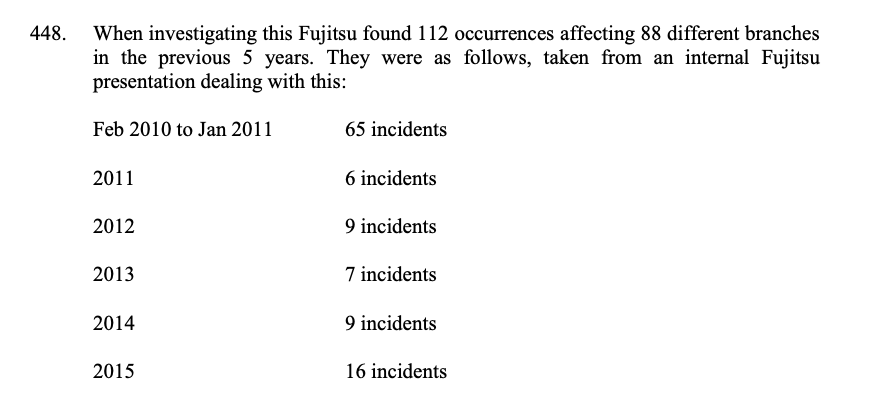
Judge Fraser noted an important comment by a Fujitsu employee which threw light on the fact that Horizon software bugs had been recognised for many years:
“925. One notable example is the expression used by Anne Chambers – “this bug has been around for years” – in February 2006.”
Judge Fraser noted that contemporaneous documents recorded that Post Office Ltd staff had seen the computer faults and had ruled out user error:
“940. I have already explained that the subject matter of the Simetra case is very different to this one, and I emphasise here that my analysis of the contemporaneous documents is in respect of the Horizon Issues in the context of this case, not the Simetra case which concerned very different allegations. Here, the categories of documents that are most illuminating in terms of specific incidents with Horizon over the years are the very numerous PEAKs and KELs. These emanate from, and are created within, Fujitsu. They are, in my judgment, a very good means of getting at the truth in this case. They show what was going on and the type of unexplained problems that numerous SPMs were experiencing in practice over the years, as they were reported to the SSC. They contain statements made when Fujitsu personnel’s “guard is down and their true thoughts are plain to see”. Some of them also record that Romec engineers, or the Post Office’s own auditors, have seen what has occurred and ruled out user error. Notwithstanding this, Fujitsu attribute user error to what has occurred.”
The judge noted that internal 2009 Post Office Ltd documents showed that the company was aware of faults in its Horizon computer system:
“942….”However, we need to continue to manage firmly any over-expectations of the frontline that Horizon Online will deliver improved functionality – they may see this as a missed opportunity so will not cure all the issues and problems that users have with Horizon although where practical, and at no extra cost, we have smoothed away a number of “rough edges”.
Judge Fraser found that a 2011 Post Office Ltd document about correcting a system fault in the handling of Camelot lottery transactions showed that user error by subpostmasters was not at issue:
“945. This has nothing to do with correcting excessive carelessness or fault on the part of SPMs. It is, in my judgment, about remedying a deficiency in the functionality of Horizon. That document also made it clear, because there are express entries to this effect, that outages might mean that the system would not deal with the matters sufficiently or accurately.”
The judge found that Post Office Ltd was negligent in its response to accounting anomalies and to the concerns raised by subpostmasters:
“217. In my judgment, the stance taken by the Post Office at the time in 2013 demonstrates the most dreadful complacency, and total lack of interest in investigating these serious issues, bordering on fearfulness of what might be found if they were properly investigated. This SPM, whose branch was known to the Post Office, should obviously have been asked for further details (if further details were required for an investigation), and the Post Office and/or Fujitsu should plainly have investigated the matter as a matter of some importance. By 2013 Horizon was an extraordinarily controversial subject; there can simply be no sensible excuse for the Post Office’s failure to try and understand this particular subject. This is particularly reprehensible given that an internal Post Office document in August 2013 showed that Mr Winn’s involvement in this was because his area of responsibility was as follows: “also responsible for resolving specific branch accounting issues.” It was his specific job to resolve specific branch accounting issues, yet he decided at the time that “we have enough on”.
Judge Fraser noted that instead of handling the concerns about the Horizon computer system properly, Post Office Ltd blamed subpostmasters for carelessness or dishonesty:
“517. The Post Office has, however, maintained publicly that it was seeking to be “transparent” about Horizon, and prior to the litigation it made certain public statements in relation to the increasing disquiet on the part both of SPMs, and others who became involved either on their behalf (such as some Members of Parliament) or in an investigative way (such as the BBC Panorama programme and other journalists). These statements by the Post Office routinely and strongly insisted that there was nothing in the criticisms being levelled at the accuracy of Horizon, and that losses that were shown in SPMs’ branch accounts were caused either by carelessness or dishonesty on the part of the different SPMs who experienced what they considered to be unexplained discrepancies and losses.”
Judge Fraser noted a point blank denial made by Post Office Ltd in 2015:
““The Post Office wholly rejects extremely serious allegations repeated in BBC’s Panorama programme of 17 August 2015. The allegations are based on partial, selective and misleading information.
-
- The Post Office does not prosecute people for making innocent mistakes and never has
- There is no evidence that faults with the computer system caused money to go missing at these Post Office branches
- There is evidence that user actions, including dishonest conduct, were responsible for missing money”
Judge Fraser noted that a 2016 letter by Post Office Ltd lawyers made the following claims, casting blame on subpostmasters:
“954…The Post Office’s solicitors’ response to the pre-action letter is dated 28 July 2016, very lengthy, and states that “the investigations to date have consistently pointed towards human error or dishonest conduct in branches as the most likely cause of shortfalls.”
The judge criticised Post Office Ltd’s decision in 2016 not to investigate one of the software bugs, and noted that internal documents showed that Paula Vennells was aware of the issue and had originally asked her staff to look into the matter:
“This needs looking into please.”
Judge Fraser criticised witnesses called by the Post Office Ltd for giving factually incorrect or misleading evidence, and he criticised submissions by Post Office Ltd. For example:
“249. Mrs Van Den Bogerd was in the witness box for in excess of one day, the longest period of any of the witnesses of fact for either the claimants or the Post Office. Her cross examination led to a far greater understanding of the Horizon Issues on the part of the court, although her written evidence was, as originally drafted, extraordinarily one- sided. She minimised any reference to problems or issues with Horizon, and reverted to potential user error whenever possible as a potential explanation, an approach which she explained in her written statement as providing “plausible” explanations. Her witness statement also stated, in terms, the exact opposite of what the reality of the situation was, and I have given examples at [221], [223] and [226] above. Witness statements are supposed to be factually accurate, and care must be taken in future rounds of this group litigation that they are drafted in accordance with the rules. Making statements that are the exact opposite of the facts is never helpful, to put it at its mildest. It is also the opposite of what witness statements are supposed to be.”
“442. Mr Godeseth gave express evidence in his witness statement that the Receipts and Payments mismatch bug occurred in September 2010. That date too was factually incorrect. The issue notes refer to Fujitsu knowing about it far earlier, and Mr Godeseth accepted he had seen this document before his cross-examination. That document even records Fujitsu being taken to task by the Post Office about how long it had taken to react, as in “We have asked Fujitsu why it has taken so long to react to and escalate an issue which began in May. They will provide feedback in due course.” Not just the impression, but the express text in Mr Godeseth’s witness statement, was to the effect that the bug was discovered in September 2010 and almost immediately dealt with. That was far from the case, and that written evidence was simply wrong.”
“422. Mr Godeseth’s witness statement about this, prior to his cross-examination, presented a very different picture to the one that eventually emerged. Indeed, I would go further, and I find that his witness statements omitted some very important headline points in respect of the Callendar Square bug, presented a chronology very different to the real one, and had the effect (whether intended or accidental) of giving a misleading impression of the Callendar Square bug and its impact.”
“294.…Mr Dunks expressly sought to mislead me by stating that there was no “Fujitsu party line” when it came to the contents of drafting witness statements about audit records for legal proceedings. There plainly is; it was used in the Fujitsu statements in 2010 and it was used by him in his statement for the Horizon Issues trial.
“565.1 A witness statement was ordered from the Post Office to explain the express, and factually incorrect, submissions made to the court by the Post Office about the Royal Mail’s refusal to produce, at the Post Office’s request, audit documents. The Royal Mail had, contrary to what the court had expressly been told by the Post Office, not even been asked by the Post Office for these. The Post Office’s leading counsel accepted that he had, entirely unwittingly, and on instruction, provided misleading information to the court and explained and apologised as soon as he discovered this.
“938. The Post Office’s approach to evidence, even despite their considerable resources which are being liberally deployed at considerable cost, amounts to attack and disparagement of the claimants individually and collectively, together with the wholly unsatisfactory evidence of Fujitsu personnel such as Mr Parker.”
Judge Fraser said he had “grave concerns” about evidence given by Fujitsu employees to other courts:
““Based on the knowledge that I have gained, I have very grave concerns regarding veracity of evidence given by Fujitsu employees to other courts in previous proceedings about the known existence of bugs, errors and defects in the Horizon system.”
Judge Fraser criticised failure of disclosure by Post Office Ltd:
“457. …To see a concern expressed that if a software bug in Horizon were to become widely known about it might have a potential impact upon “ongoing legal cases” where the integrity of Horizon Data was a central issue, is a very concerning entry to read in a contemporaneous document. Whether these were legal cases concerning civil claims, or criminal cases, there are obligations upon parties in terms of disclosure. So far as criminal cases are concerned, these concern the liberty of the person, and disclosure duties are rightly high. I do not understand the motivation in keeping this type of matter, recorded in these documents, hidden from view; regardless of the motivation, doing so was wholly wrong. There can be no proper explanation for keeping the existence of a software bug in Horizon secret in these circumstances.”
Judge Fraser criticised Post Office Ltd’s “extreme” preoccupation with protecting reputation and its avoidance of scrutiny:
“946. A theme contained within some of the internal documents is an extreme sensitivity (seeming to verge, on occasion, to institutional paranoia) concerning any information that may throw doubt on the reputation of Horizon, or expose it to further scrutiny. One entry in a document that makes it clear that the Post Office itself had already recognised this is contained in a document authored by Mrs Van Den Bogerd, entitled “Extracts from Lessons Learned Log” and dated 11 November 2015. One entry under “issues identified” was as follows in respect of the Post Office’s behaviour up to that date:
“Failure to be open and honest when issues arise eg roll out of Horizon, HNGx migration issues/issues affecting few branches not seemingly publicised.” (emphasis added)”
Judge Fraser noted that Paula Vennells asked her staff about remote access to the Horizons computer system, (and whether parties other than subpostmasters could be responsible for amending records), and that at the same time she told her staff what she wished to say to the BIS select committee:
“545….The statement in the Defence was misleading too. It ought also to be noted that the truth did not emerge internally within the Post Office in the email answers provided to internal inquiries in 2015 by senior Post Office personnel, such as the Chief Executive, who posed the specific question in preparation for providing evidence to a Select Committee and asked: “What is the true answer?”
“546. She also said in the same email “I hope it is that we know this is not possible and that we are able to explain why that is”. The true answer is that, contrary to her aspiration, it was possible.”
“547. She also stated “I need to say no it is not possible and that we are sure of this because of xxx and that we know this because we have had the system assured.” The true answer to that was also “yes, it is possible”.
Judge Fraser has passed a file to prosecutors:
Post Office faces potential criminal probe over Fujitsu IT system’s accounting failures
You will note that the above article on the criminal probe observes that the judge made a finding that Post Office Ltd misled Lord Arbuthnot in 2015, when Paula Vennells was CEO.
Lord Justice Coulson of the Court of Appeal who rejected an appeal by Post Office Ltd has equated Post Office Ltd’s misconduct as an employer with the behaviour of “Victorian factory owner”
“The stamp of disapproval: Post Office accused of treating staff like ‘Victorian factory’ workers”
The Law Gazette described Lord Justice Coulson’s judgment against Post Office Ltd as “damning”:
“The Post Office is accused of blaming sub postmasters and mistresses (SPMs) for alleged shortfalls in branch accounts since the roll out of a computer system called Horizon. Earlier this month it sought to appeal the judgement of the first trial, known as the ‘common issues trial’.
However, Lord Justice Coulson dismissed the Post Office’s appeal on all 26 grounds, citing ‘a number of reasons which militate against granting the PO permission to appeal’ and comparing the business to a ‘a mid-Victorian factory-owner’.”
In his judgment, Lord Justice Coulson noted that Post Office Ltd’s application to appeal misrepresented findings by the original judge and it had made claims which were “demonstrably wrong”:
“Many of the PO’s difficulties now are self-inflicted. For example, as happened during the trial and on the application for permission to appeal both to the judge, and to this court, the PO has consistently put its arguments much too high. It made sweeping statements about the trial and the judgment which were demonstrably wrong. The PO ascribed various findings or conclusions to the judge which, on analysis, form no part of his judgment.”
He also dismissed aspects of Post Office Ltd’s application to appeal as:
“fanciful and wholly unpersuasive.”
He also criticised Post Office Ltd’s aggressive litigation style:
“7. Another aspect of the PO’s litigation strategy which works against them now is their desire to take every point, regardless of quality or consequences. That was regularly apparent during the trial, where the judge correctly labelled their approach as “attritional”. The same approach was still in evidence on the application for permission to appeal.”
Lord Justice Coulson singled out this example of unreasonable, unaccountable behaviour by Post Office Ltd:
“8.….The PO accepted at trial that the written contracts (the SPMC and the NTC) were inadequate as they stood and that some terms had to be implied. But the PO’s proposed terms were pitched at such a high and general level that they were of no practical value. By contrast, the SPMs put forward 20 odd detailed terms for the judge’s consideration. The judge asked the PO to be more helpful: the PO’s pleaded response was a one-line assertion that the terms put forward by the SPMs were denied. Having refused to put forward the detail of their case on the implied terms at the appropriate time, the PO cannot seriously complain now because they do not like the detail of the implied terms found by the judge.”
The massive cost of legal proceedings, which have been inflated by Post Office Ltd’s aggressive tactics over years and which will reduce the real level of compensation available to the harmed subpostmasters, have been much criticised.
Lord Arbuthnot has called for a clear out of Post Office Ltd’s board in the light of all the extremely serious failures of governance and probity:
Peer calls for clear-out of Post Office board after Court of Appeal confirms major court defeat
Lord Arbuthnot advised that the consultancy Second Sight will hold detailed evidence of executive culpability:
“My own suggestion is that the government should clear out the entirety of the board and senior management of the Post Office and start again, perhaps with the assistance of consultancy services from Second Sight, who know where the bodies are buried,” he said.”
The final report compiled by Second Sight reported that certain themes emerged from subpostmaster’s complaints about mistreatment by Post Office Ltd:
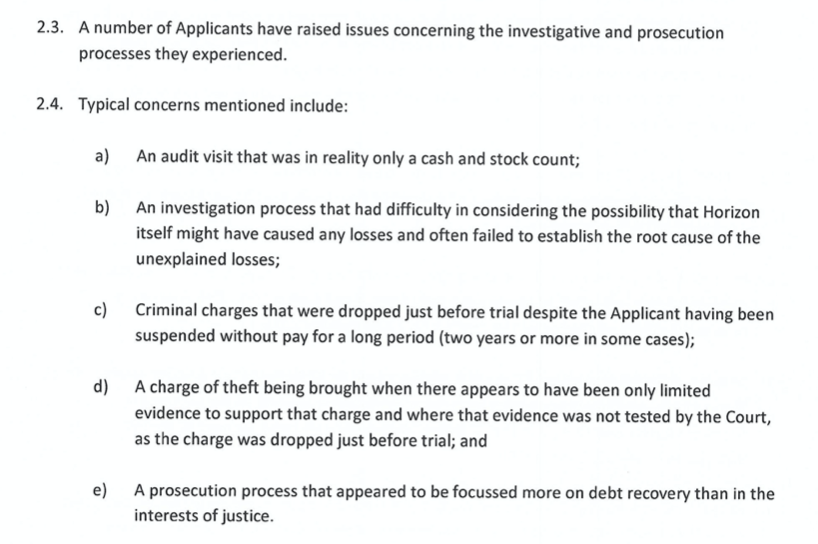
Second Sight reported on many examples of unfairness in Post Office Ltd’s treatment of subpostmasters. For example:


Second Sight noted a denial by Post Office Ltd that it could remotely access and manipulate branch records, which the High Court has since found to be untrue:
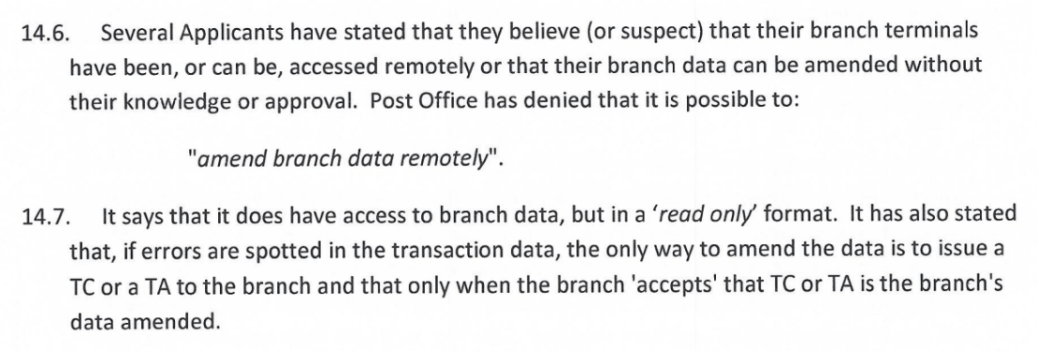
Second Sight reported a lack of cooperation by Post Office Ltd in looking at cases of possible miscarriage of justice:
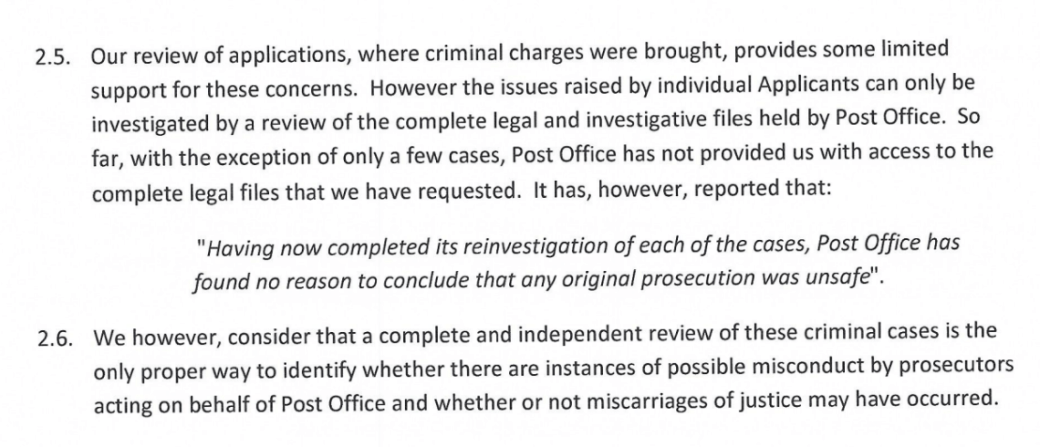
Some accused subpostmasters reported harassment by Post Office Ltd staff and intrusive searches of their homes. For example, Tracey Merritt reported that her home was searched and that she was asked to sign a “confession” composed for her by Post Office Ltd staff:
“The confession said that I had taken the money and gone shopping.”
The Sunday Times quoted Lord Arbuthnot’s comments on Paula Vennells’ role:
““These people have been under extraordinary pressure for decades,” he said. “The Post Office clearly knew there were things wrong with the [IT] system.”
He said the settlement was “not enough” to make up for the suffering they had endured. An inquiry, he added, would root out who was accountable. “It starts with Paula Vennells, but it includes the whole board of the Post Office.””
The Sunday Times has reported that Paula Vennells has “declined to apologise”.
The Daily Mail has also reported on her failure to apologise:
Her role in these matters have been documented by Nick Wallis, a journalist who has followed the Post Office trial in great detail:
In 2015 Paula Vennells appeared before the parliamentary Business, Innovation and Skills Committee and gave evidence about the Horizon computer system scandal:
BIS Select Committee inquiry on Post Office mediation and the Horizon computer system
Mr Wallis writes thus of the 2015 proceedings:
“During that inquiry, Ms Vennells refused to accept the Post Office had done anything wrong with regards to prosecuting its Subpostmasters, and during that session she failed to answer a question about how much legal coaching she’d received in advance of answering MPs questions.”
As is plain from Judge Fraser’s detailed judgment of 16 December 2019 and the Second Sight report, by 2015, Post Office Ltd was in fact in possession of substantial evidence of faults in its Horizon computer system.
Hundreds of subpostmasters and their families have been harmed by Post Office Ltd’s cover up and scapegoating. Some of the harmed individuals have been financially ruined, suffered grave damage to their reputations and livelihoods, serious damage to their health and some have been wrongfully prosecuted, convicted and jailed. A pregnant subpostmaster, Seema Misra, was jailed:
Jailed Post Office worker: I wanted to kill myself
Some have died.
These are some powerful individual accounts of their suffering that have been collated by Nick Wallis:
You will see from the testimony of victims and their families that some of the affected individuals have died, some through suicide:
The Criminal Cases Review Commision confirmed that it was looking into 35 cases of reported miscarriages of justice from the Horizons computer affair, involving 22 prison sentences:
CCRC FOI disclosure March 2019
The Post Office Horizons computer scandal has been catastrophic not only for these individuals, but for confidence in an important organisation and the stability of Post Office Ltd. It has cost the public purse millions that could have been avoided if the Post Office Ltd had acted more accountably and responsibly.
Given Paula Vennells’ role at the helm of Post Office Ltd for seven years, during which the scandal was mishandled, I would be grateful if you would review the Fit and Proper Person arrangements at Imperial College Healthcare NHS Trust.
It is vital that NHS staff should not be exposed to the sort of risks and harm that befell subpostmasters, and that any organisational wrongdoing and any patient harm and deaths caused by Imperial Healthcare NHS Trust should not be approached in the way that Post Office Ltd approached the flaws in the Horizon computer system.
I copy this to Lord Arbuthnot for his information, and I copy it to Dido Harding the chair of NHS Improvement, which is the body which is responsible for appointing the directors of non-Foundation NHS trusts such as Imperial College Healthcare NHS Trust. I also copy it to Tom Kark QC in respect of his review of the application of FPPT in the NHS.
Lastly, I note that on 23 July 2019, after Paula Vennells had joined the trust, that the Care Quality Commission rated the trust as “Good” in the Well-Led domain.
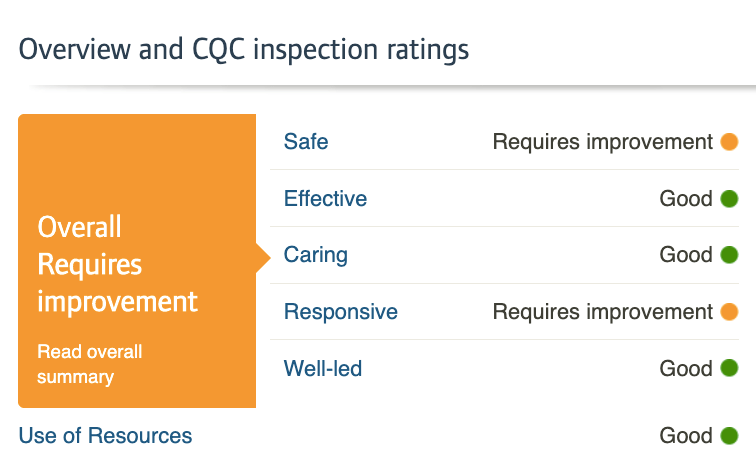
The CQC inspection team was as follows:
“The inspection team consisted of one CQC hospital inspector, an observer (CQC staff) and two specialist advisors (matron and head of midwifery). The inspection was overseen by Terri Salt interim head of hospital inspections”
I found no comment in CQC’s inspection report on whether the trust was meeting its duty under FPPR to ensure that its directors were Fit and Proper individuals.
Instead, there were these comments on how the trust continued to be “Well Led” following Paula Vennells’ appointment as trust chair:
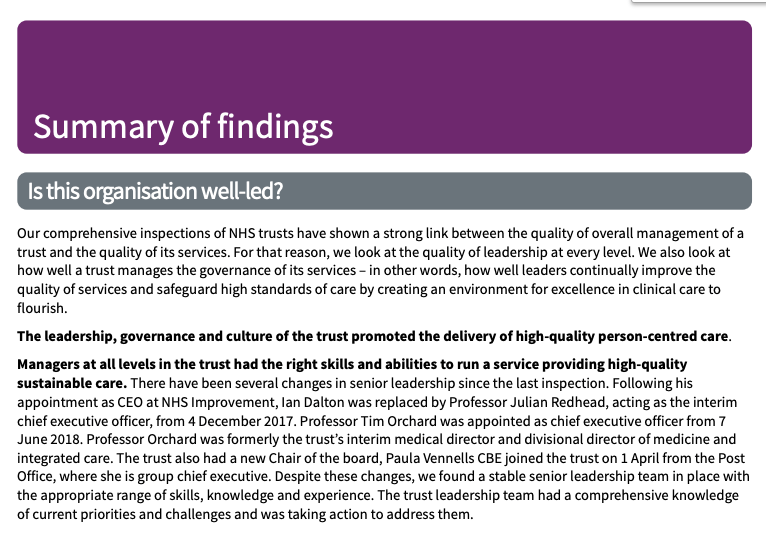
Yours sincerely,
Dr Minh Alexander
Cc Ted Baker CQC Chief Inspector of Hospitals
Dido Harding Chair of NHS Improvement
Lord Arbuthnot
Tom Kark QC
RELATED ITEMS
This is a round up on some unresolved issues from the Post Office Trial by Tim McCormack @Jusmasel2015:
What else could possibly go wrong?
To find out more about the Post Office trial, follow the twitter hashtag #PostOfficeTrial
Sorry is the hardest word: CQC, Paula Vasco-Knight and Regulation 5 Fit and Proper Persons
Another turn of the Magic Roundabout: Jo Williams’ referees
Regulation 5, Fit and Proper Persons: Dissecting CQC’s Dissembling
NHS Improvement’s Kark implementation process & dissing dissent



The evidence is all there. Anyone capable of reading will have a painfully clear understanding of this scandal.
Anything I add is probably a distraction, but I would like to contribute just a few stray thoughts.
I treasure the intervention of Lord Arbuthnot; his remarks and recommendations. Yes, we must have a judge-led inquiry – not just any judge but, a Sir Peter Fraser judge-led inquiry. Obviously, the whole Post Office Board plus the Government will be required to attend and enjoy the opportunity of being questioned.
According to the Daily Mail of 24th May last, Paula Vennells received £3.7m over six years, signed off by the Government which owns Post Office Ltd.
Bearing in mind that Paula Vennells is also an ordained Church of England priest, I do wonder if, having been visited by the Spirits of Christmas Past and Christmas Present, she is tempted to donate the bulk of her salaries, without admitting to any legal liability, to those who are in greater need?
Indeed, sustained by her faith, I feel confident that Miss Vennells could make her contribution to society in a visibly humble manner from a conspicuously humble place.
I look forward to learning of the response to the FPPR which, whatever form it takes, will doubtless be illuminating.
Thank you very much, Dr A., for presenting this affront in an impossible-to-misunderstand form, thus honouring the innocent and shaming the negligent, apathetic and guilty.
LikeLike
Thank you again Zara for drawing this matter to my attention. I am so appalled by it. Words can’t adequately express the ordeal that subpostmasters and their families have endured, so unjustly. The consequences of being wrongly accused can be enormous, as can the health impact. There was work on the experiences of the Birmingham Six who were wrongly jailed for the Birmingham bombings: https://www.ncjrs.gov/App/Publications/abstract.aspx?ID=203915
I hope the Post Office/ government can be made to pay any personal injury compensation that is due to the victims of this scandal. Not least because the government has neglected and messed up NHS mental health services, that some of the specialist care needed may have to be accessed privately – and funded.
LikeLiked by 1 person
Thank you for your kind words. Unfortunately, my input has been only token but I do thank you for your substantial contribution – invaluable.
I first heard of the PO scandal via the Panorama programme which included the analysis by the excellent Tony Collins of Campaign4Change. He has been a stalwart watchdog and commentator on this matter and others.
It wasn’t just the original ineptness of the Post Office but the apathy of those in positions of authority that appals. The victims must have felt they had nowhere to turn as no one apparently wanted to hear them, particularly to the background of the PO’s carefully managed public image of old world charm and respectability.
I knew you would understand because of your insights into the shortcomings of the NHS with any criticism of certain sections taken as an attack on a much loved institution. The same happens with the police service and armed services.
One good thing to come out of the Birmingham Six is Paddy Hill. He runs MOJO – Miscarriages of Justice Organisation. As you can imagine, he offers support to those
(many) who have been, to put it mildly, let down by the judicial system.
I won’t go on but will end by wishing you and yours a very Happy New Year.
LikeLike
This woman Paula Vennels should immediately resign from the boards of Morrisons,Dunelm and the NHS trust she is involved with,return her CBE and make a public apology but of course she will not,what an advert she is for the church.
LikeLiked by 1 person
Prime example of Total Denial.
Has taken Reverse Halo Effect to those Businesses she is now with & they don’ t realise it!
Is it true she’s e lay preacher?
LikeLike
Whilst not as bad as Putin, Paula Vennels has blighted the lives of so many people and seems to have no regret whatever. Just moves on to several board appointments, one of them NHS for God’s sake. What damage is her incompetence going to lead to there. She is also an ordained minister, what an advert for atheism.
LikeLike